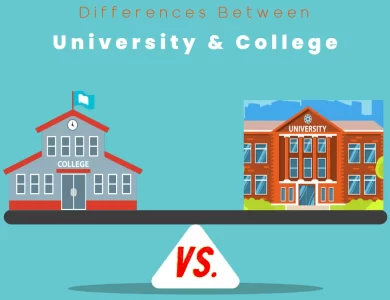Qualifications
If you’ve ever wondered about the disparities in terminologies and other elements within various qualifications, you’re in the right place. In this engaging collection of content, we aim to shed light on the divergences that exist, unraveling the complexities and demystifying the jargon.
So, whether you’re a curious learner, a professional seeking to expand your knowledge, or an employer looking to understand the subtleties of qualifications, this category page is your go-to resource. Prepare to embark on a journey of discovery as we examine the differences in terms, frameworks, requirements, and more across a range of qualifications.
-

Research vs Masters by Coursework
Choosing between pursuing a Master's by Coursework or a Master's by Research is a pivotal decision that shapes your academic journey and future career prospects. These two pathways represent distinct approaches to higher education, each with its own unique characteristics and advantages. Let's delve into the key differences to help you make an informed choice. Master's by Coursework: Master's by Coursework programs are renowned for their structured approach. In these programs, you'll follow a predetermined curriculum, encompassing a range of courses within your chosen field of study. This curriculum is designed to provide you with a comprehensive knowledge base and a diverse set of practical skills. The typical duration of a Master's by Coursework program is one to two years, making it a shorter and more focused option. Assessment primarily revolves around exams, assignments, and projects related to the coursework. The research component in these programs is limited, and a thesis or dissertation is typically not required. Master's by Coursework programs are well-suited for individuals who aim to enter the workforce immediately after graduation and seek a structured learning experience. Master's by Research: On the other hand, Master's by Research programs emphasize independent research. While some coursework may be involved, the core of the program revolves around conducting original research under the guidance of a faculty advisor. These programs offer more flexibility in terms of duration, with the completion timeline typically ranging from one to two years, although it can vary based on the complexity of your research. Assessment in Master's by Research programs is centered on monitoring your research progress and the quality of your thesis or dissertation, which is a mandatory requirement. Research is an integral part of the program, and you'll have the opportunity to immerse yourself in a specific research topic. This pathway is ideal for…
-

Diploma vs Certificate
When it comes to advancing your education or enhancing your skill set, choosing between a certificate and a diploma program is a crucial decision. These two credentials may seem similar on the surface, but they have distinct characteristics that can significantly impact your career and educational journey. Certificates are short-term programs designed to provide specialized skills in a specific field. They are often completed in a matter of weeks to a few months and focus on practical, job-ready knowledge. Certificates are a popular choice for individuals seeking quick entry into the workforce or looking to acquire specific skills relevant to their career goals. They are highly accessible, with minimal entry requirements, making them suitable for a wide range of learners. On the other hand, diplomas offer a more comprehensive education. These programs typically span one to two years of full-time study and cover a broader range of topics within a chosen field. Diplomas are ideal for those who desire in-depth knowledge and a well-rounded understanding of their subject matter. They can lead to more advanced positions and may serve as a stepping stone for further education, such as pursuing a bachelor's degree. In our comprehensive guide, we will delve into the key differences between certificates and diplomas, including program duration, curriculum focus, entry requirements, career opportunities, and more. By the end, you'll have a clear understanding of which credential aligns best with your educational and career objectives.
-

CMA vs CGA
Are you pondering over the choice between CGA (Certified General Accountant) and CMA (Certified Management Accountant) certifications? These two prestigious designations open doors to diverse career opportunities in the realms of finance and accounting. To help you make a well-informed decision, let's delve into the primary disparities between CGA and CMA. The first fundamental difference lies in their career focus. CGA offers a versatile skill set, covering various aspects of accounting and finance. If you're seeking a broader range of roles, including financial analysis, tax consultation, or auditing, CGA might be the right path for you. In contrast, CMA specializes in management accounting, financial management, and strategic planning. This specialization equips CMAs to excel in roles that require strategic financial decision-making, such as Chief Financial Officer (CFO) or Controller positions. Moreover, their educational requirements differ. CGA typically mandates a bachelor's degree in any field, while CMA requires a bachelor's degree from an accredited institution, without specifying a particular field of study. The examination structures also diverge, with CGA involving a series of exams followed by the Common Final Examination (CFE), and CMA employing a two-part examination process, beginning with the CMA Entrance Exam. Understanding these distinctions, along with factors like ongoing requirements and global recognition, is crucial in determining which certification aligns best with your career aspirations. So, if you're ready to embark on this enlightening journey of choice, read on to explore the nuances of CGA vs. CMA certifications.
-

MBA vs MCA
Navigating the labyrinth of higher education often leads to the crossroads of MCA (Master of Computer Applications) and MBA (Master of Business Administration). These two acronyms represent distinct trajectories – MCA delves into the intricacies of technology and computer applications, while MBA equips you with the art of business administration and management. The choice between MCA and MBA holds the potential to shape your career compass, and understanding their nuances is paramount. MCA's curriculum is intertwined with programming languages, software engineering, data structures, and networking, sculpting tech-savvy professionals. On the flip side, MBA's canvas encompasses marketing, finance, strategic planning, and leadership, crafting business leaders. The career trajectories diverge – MCA graduates venture into software development, network management, and cybersecurity, while MBA graduates thrive in roles like marketing managers, financial analysts, and operations directors. The financial landscape varies too, with MCA professionals earning a median salary of $60,000 to $100,000, and MBA professionals securing $70,000 to $120,000, with the potential for lucrative leadership roles. As you stand at this juncture, your interests, strengths, and aspirations will guide your choice. Whether you're drawn to the rhythm of code or the orchestra of business strategies, the path you choose is a step toward an exciting and rewarding future.
-

Doctorate vs PhD
Are you standing at the crossroads of higher education, torn between pursuing a PhD or a Doctorate? This decision can shape your academic and professional journey in profound ways. A PhD, or Doctor of Philosophy, isn't limited to philosophy; it's a research-intensive program spanning diverse fields. It's about pushing boundaries, uncovering new knowledge, and becoming an expert in your chosen domain. On the other hand, the term "Doctorate" encompasses a spectrum of advanced degrees, from Doctor of Education (EdD) to Doctor of Business Administration (DBA), each tailored to specific industries and career paths. The main distinction lies in the focus: PhD emphasizes research and contributions to academia, while Doctorate degrees often prioritize practical application, leadership, and expertise in industries. If you envision shaping the future of your field through groundbreaking research, a PhD might be your calling. Alternatively, if you're drawn to making a tangible impact in industries and steering innovation, a Doctorate could be the perfect fit. This guide delves into the nuances, career prospects, and considerations of both paths, empowering you to embark on the educational journey that aligns with your aspirations.
-

University vs College
Are you feeling perplexed by the terms "university" and "college"? Do you find yourself wondering what sets them apart in the realm of higher education? Look no further! In this article, we unravel the distinctions between universities and colleges, shedding light on their academic programs, campus experiences, and more. Whether you're a student navigating the college application process or simply curious about the education landscape, join us on this enlightening journey as we explore the captivating differences between universities and colleges. Universities encompass a vast array of undergraduate and postgraduate programs across various disciplines. With an emphasis on research and innovation, universities often boast cutting-edge facilities and renowned faculty members who actively contribute to their fields. On the other hand, colleges typically specialize in undergraduate education, offering programs tailored to specific fields of study. These institutions often prioritize practical skills and career readiness, providing students with a more intimate and personalized learning environment. Beyond academic offerings, universities and colleges differ in campus size, faculty-student ratios, and the overall campus culture. Universities often feature sprawling campuses with diverse resources and extracurricular activities, fostering a vibrant and multicultural atmosphere. Meanwhile, colleges offer a tight-knit community where students benefit from smaller class sizes and closer interactions with professors. Join us on this educational voyage as we delve into the captivating realm of universities and colleges. Gain valuable insights to inform your educational journey and make an informed decision about your future.





